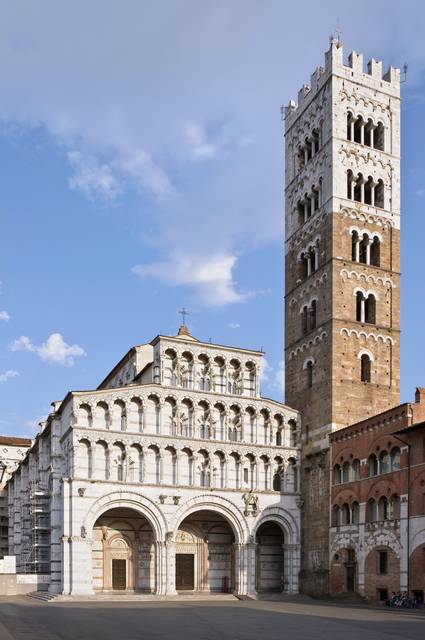
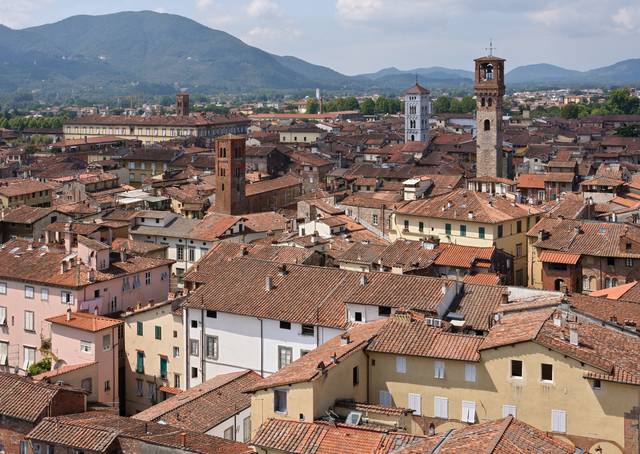 Lucca is a city of some 90,000 people in Tuscany. Its long history goes back to Etruscan and Ancient Roman times, and the city retains pieces of ancient architecture. Lucca's heyday was in the Gothic era just before the Renaissance, and the city contains much marvellous architecture from that era. Lucca remained an independent city state until the end of the 18th century. Giacomo Puccini, one of the best-known opera composers, was born in Lucca, and his house is visited by many opera-lovers every year.
Lucca is a city of some 90,000 people in Tuscany. Its long history goes back to Etruscan and Ancient Roman times, and the city retains pieces of ancient architecture. Lucca's heyday was in the Gothic era just before the Renaissance, and the city contains much marvellous architecture from that era. Lucca remained an independent city state until the end of the 18th century. Giacomo Puccini, one of the best-known opera composers, was born in Lucca, and his house is visited by many opera-lovers every year.
The area of most interest to visitors is still enclosed within the old city's defensive walls. The top of these broad walls is a ring park, a pleasant place for walking.
- Tourist Center. Daily 9:00-19:00. You can deposit luggage here (€3 per bag up to 3 hours, €5 whole day), hire bikes and join guided bike tours (from €49 per person).
Tourist Center. Daily 9:00-19:00. You can deposit luggage here (€3 per bag up to 3 hours, €5 whole day), hire bikes and join guided bike tours (from €49 per person).
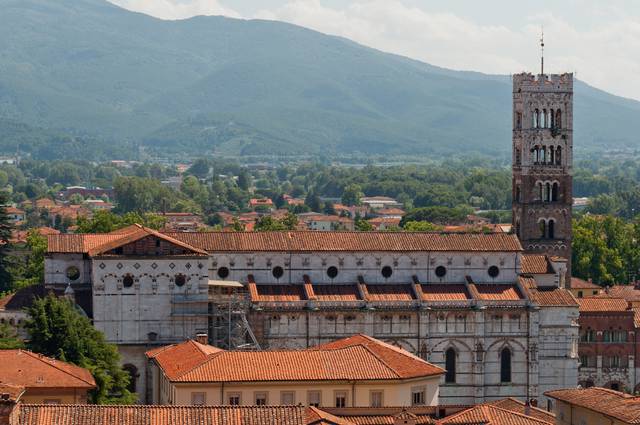
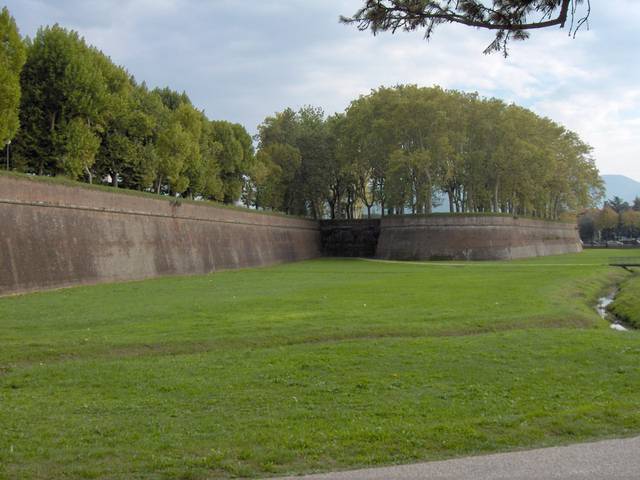
- City Walls. One can walk or cycle on top of the ancient city walls. The entire perimeter is approximately 4 km. This gives a good introduction to the city layout. Expect crowds in the summer months.
- Piazza dell'Anfiteatro. A former Roman amphitheater, but the remains of the amphitheater are gone. The houses there are of medieval origin, built where the spectator stands were.
- Duomo di San Martino, Piazza di San Martino. Romanesque cathedral dating to 14th century. Contains the must-see Volto Santo and Ilaria del Carretto's Sarcophagus by Jacopo della Quercia (as of May 2014 you have to pay an additional 4 € to see this). Includes a sculpture of the crucifixion attributed to an eyewitness, Nicodemus. Some interesting carvings in the marble exterior, including a labyrinth. 3 €.
- Torre Guinigi. This is a tower with trees atop it, a very dramatic sight, with good views of the city. No lift, many stairs. As of July 2019 the normal entrance price is 5 € and the reduced price is 4 €. It is also possible to buy one ticket for both Torre Guinigi, Torre delle Ore and botanical garden for 9 € total.
- Torre delle Ore. Ancient clock tower with original clock still working. It is possible to go upstairs in this tower for a beautiful view of the city and a good perspective of Fillungo street. Great views of Torre Guinigi's trees. No lift. As of July 2019 the normal entrance price is 5 € and reduced price is 4 €. It is also possible to buy one ticket for both Torre Guinigi, Torre delle Ore and botanical garden for 9 € total.
- Puccini Museum, Corte San Lorenzo, 9, +39 583 584028. This was Puccini's birthplace and is now a museum about the composer.
- Palazzo Mansi.
- Saint Michael's Church.
- Saint Frediano's Church.
- Via Fillungo. Main street full of shops and bars.
- Palazzo Pfanner, Via degli Asili, +39 340 923 30 85. Preserved rooms formerly inhabited by the Pfanner family, as well as a pleasant garden. Also on display, some 19th century medical equipment. 4 €.
- Piazza Napoleone. Lucca's largest square. Contains the large Palazzo Ducale, now a government building.
- Domus Romana. Remains of an old Roman home, have been partially excavated, and may be seen at via Cesare Battisi 15 (at via San Giorgio). €3.
- Statue of Luigi Boccherini.
- Lucca has many old churches, some of which now house art galleries.
City Walls. One can walk or cycle on top of the ancient city walls. The entire perimeter is approximately 4 km. This gives a good introduction to the city layout. Expect crowds in the summer months.
Piazza dell'Anfiteatro. A former Roman amphitheater, but the remains of the amphitheater are gone. The houses there are of medieval origin, built where the spectator stands were.
Duomo di San Martino, Piazza di San Martino. Romanesque cathedral dating to 14th century. Contains the must-see Volto Santo and Ilaria del Carretto's Sarcophagus by Jacopo della Quercia (as of May 2014 you have to pay an additional 4 € to see this). Includes a sculpture of the crucifixion attributed to an eyewitness, Nicodemus. Some interesting carvings in the marble exterior, including a labyrinth. 3 €.
Torre Guinigi. This is a tower with trees atop it, a very dramatic sight, with good views of the city. No lift, many stairs. As of July 2019 the normal entrance price is 5 € and the reduced price is 4 €. It is also possible to buy one ticket for both Torre Guinigi, Torre delle Ore and botanical garden for 9 € total.
Torre delle Ore. Ancient clock tower with original clock still working. It is possible to go upstairs in this tower for a beautiful view of the city and a good perspective of Fillungo street. Great views of Torre Guinigi's trees. No lift. As of July 2019 the normal entrance price is 5 € and reduced price is 4 €. It is also possible to buy one ticket for both Torre Guinigi, Torre delle Ore and botanical garden for 9 € total.
Puccini Museum, Corte San Lorenzo, 9, +39 583 584028. This was Puccini's birthplace and is now a museum about the composer.
Palazzo Mansi.
Saint Michael's Church.
Saint Frediano's Church.
Via Fillungo. Main street full of shops and bars.
Palazzo Pfanner, Via degli Asili, +39 340 923 30 85. Preserved rooms formerly inhabited by the Pfanner family, as well as a pleasant garden. Also on display, some 19th century medical equipment. 4 €.
Piazza Napoleone. Lucca's largest square. Contains the large Palazzo Ducale, now a government building.
Domus Romana. Remains of an old Roman home, have been partially excavated, and may be seen at via Cesare Battisi 15 (at via San Giorgio). €3.
Statue of Luigi Boccherini.
Lucca has many old churches, some of which now house art galleries.
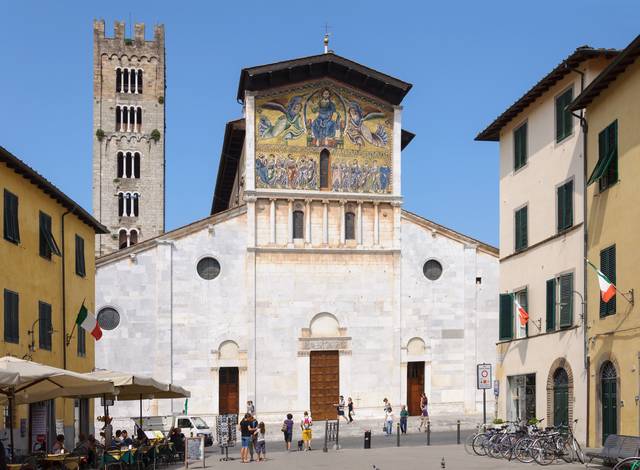
- Puccini opera & recitals: The composer Puccini (1858-1924) was born and grew up in Lucca. His works are regularly performed here throughout the year. From 1891 he lived at Torre del Lago on the coast 20 km west, and built a villa there; the annual Puccini festival is held nearby. In 1921 a peat works polluted the neighbourhood so he moved to neighbouring Viareggio. Puccini villa at Torre del Lago. is nowadays a museum and he's buried in the chapel there.
- Bagni di Lucca's spa. Bagni di Lucca is laying between the Appenine Mountains giving a semblance of a climatic mountain resort despite it's 152 meters above sea level, perfectly integrated by the River Lima and Serchio, from which the Valley takes its name, can be considered an oasis of peace and serenity.
- Puccini festival. An opera festival dedicated to Puccini, staging all his best-loved works. It is held July to August in Torre del Lago on the coast near Lucca.
- Lucca summer festival. A series of concerts by major international rock stars, held annually end of June into July. It's not like a "greenfield" rock festival with concentrated venue, time-span and mud. Most events are in Piazza Napoleone in the old town centre. Standing-room tickets are available, these are released separately as each act confirms their dates.
- Lucca Comics and Games, Piazza San Romano. The largest comic book and gaming festival in Europe, held in the long week-end around November 1, a national holiday in Italy. It includes many events, guests and open-air market stands around the city centre, and the city is full with cosplayers in colourful costumes. 2018 festival is Wed 31 Oct - Sun 4 Nov, dates for 2019 not yet confirmed. Around 15-20 Euros per day.
Puccini festival. An opera festival dedicated to Puccini, staging all his best-loved works. It is held July to August in Torre del Lago on the coast near Lucca.
Lucca summer festival. A series of concerts by major international rock stars, held annually end of June into July. It's not like a "greenfield" rock festival with concentrated venue, time-span and mud. Most events are in Piazza Napoleone in the old town centre. Standing-room tickets are available, these are released separately as each act confirms their dates.
Lucca Comics and Games, Piazza San Romano. The largest comic book and gaming festival in Europe, held in the long week-end around November 1, a national holiday in Italy. It includes many events, guests and open-air market stands around the city centre, and the city is full with cosplayers in colourful costumes. 2018 festival is Wed 31 Oct - Sun 4 Nov, dates for 2019 not yet confirmed. Around 15-20 Euros per day.
Puccini opera & recitals: The composer Puccini (1858-1924) was born and grew up in Lucca. His works are regularly performed here throughout the year. From 1891 he lived at Torre del Lago on the coast 20 km west, and built a villa there; the annual Puccini festival is held nearby. In 1921 a peat works polluted the neighbourhood so he moved to neighbouring Viareggio. Puccini villa at Torre del Lago. is nowadays a museum and he's buried in the chapel there.
Bagni di Lucca's spa. Bagni di Lucca is laying between the Appenine Mountains giving a semblance of a climatic mountain resort despite it's 152 meters above sea level, perfectly integrated by the River Lima and Serchio, from which the Valley takes its name, can be considered an oasis of peace and serenity.
The main shopping street is Via Fillungo which runs roughly north/south through the centre of the city. It has a mix of high to mid-range shops selling a range of Italian designer labels such as Missoni, Armani, Max Mara, etc.
- Enoteca Vanni, Piazza del Salvatore 7, +39 0583 491902. closed Sundays?. A decent wine and liquor store. One could spend some time poking around the four cellar rooms.
Enoteca Vanni, Piazza del Salvatore 7, +39 0583 491902. closed Sundays?. A decent wine and liquor store. One could spend some time poking around the four cellar rooms.
Only in Lucca you can find a special sweet-bread in shape of a small baguette or a bun. It's called Buccellato and it has raisins inside and has a unique taste of anise. You can find it in a small shop called Taddeucci, behind Saint Michael's church in the main square.
- Trattoria da Leo, Via Tegrimi 1, +39 0583 492236. Fairly typical Tuscan cuisine with some Luccan touches (e.g. pine nuts). The menu is only in Italian. Vegetarian friendly. Reservations are a good idea or arrive around 7:00.
- Pizzeria La Bersagliera, Via Pisana 2136, +39 0583510758. If you happen to have a car, do check out this pizzeria, just ten minutes drive outside of town, it's worth. The owners come from Calabria, so you are likely to find all kinds of spicy salami, olives, mushrooms on top of your pizza. A different meal, served by distracted waitresses. Beware: You can't have your espresso coffee there. Being asked for coffees, the old owner – I don't think she's still around – used to reply: "Yeah, go get that at La Cubana", which is a bar downtown. Oh, and you can't make reservations: Be there by 7PM.
- Forno a vapore Amedeo Giusti, Via Santa Lucia 18/20, +39 0583 496285. Strolling along the Torre Guinigi (the one with trees on top), you'll probably sniff some irresistible oily and flory smell. It's called focaccia, the Lucchese idea of a snack.
Trattoria da Leo, Via Tegrimi 1, +39 0583 492236. Fairly typical Tuscan cuisine with some Luccan touches (e.g. pine nuts). The menu is only in Italian. Vegetarian friendly. Reservations are a good idea or arrive around 7:00.
Pizzeria La Bersagliera, Via Pisana 2136, +39 0583510758. If you happen to have a car, do check out this pizzeria, just ten minutes drive outside of town, it's worth. The owners come from Calabria, so you are likely to find all kinds of spicy salami, olives, mushrooms on top of your pizza. A different meal, served by distracted waitresses. Beware: You can't have your espresso coffee there. Being asked for coffees, the old owner – I don't think she's still around – used to reply: "Yeah, go get that at La Cubana", which is a bar downtown. Oh, and you can't make reservations: Be there by 7PM.
Forno a vapore Amedeo Giusti, Via Santa Lucia 18/20, +39 0583 496285. Strolling along the Torre Guinigi (the one with trees on top), you'll probably sniff some irresistible oily and flory smell. It's called focaccia, the Lucchese idea of a snack.
- Vecchia Trattoria Buralli. It is practically hidden on via San Giorgio and one of the best restaurants. With a constantly changing menu and an extensive wine list.
Vecchia Trattoria Buralli. It is practically hidden on via San Giorgio and one of the best restaurants. With a constantly changing menu and an extensive wine list.
- Buca di San Antonio. Enjoys a high reputation for local dishes prepared in the traditional Lucchesi style.
- Ristorante Giglio. Offering wonderful Lucchesi cuisine, attentive staff and a delightful terrace overlooking the square.
Buca di San Antonio. Enjoys a high reputation for local dishes prepared in the traditional Lucchesi style.
Ristorante Giglio. Offering wonderful Lucchesi cuisine, attentive staff and a delightful terrace overlooking the square.
It is safe to drink the water that comes out of the public fountains. Many locals fill gallon jugs and it is their primary source of drinking water. It is delicious and quite refreshing. In fact, it tastes better than most bottled water.
The digestive tonic China Massagli is produced at the Farmacia Massagli in Lucca. This is an eminent example of the "china" style of amaro (Italian potable bitters). If you ask for an "amaro locale" at a restaurant, this is likely what you will receive.
Biadina is another local style of bitters, bottled by Massagli and other producers; this drink is often sold with a small pack of pine nuts.
Compared to Florence or Siena, there is relatively little late night activity on the streets of old Lucca. The San Colombano, on top of the walls, overlooking the train station, the Betty Blue (near piazza Santa Maria), the Rewine near San Michele and the Cupido and McCulloughs, outside the walls near the station are some of the bars open late, especially in the summer.
Most locals tend to make the short trip to Viareggio on the coast, which offers a far better selection of clubs, such as 7 Apples and La Canniccia.
- Pisa is an easy day-trip by train. For sights around the leaning tower, get off at Pisa San Rossore which is only 400 m west of it, while Pisa Centrale is 1.5 km south.
- Florence is also an easy day-trip, much better done by train (90 mins) even if you have a car.
- Garfagnana is a hilly, forested area north of Lucca, with the historic small town of Barga.
- Versilia is where the glitterati come to the seaside.
